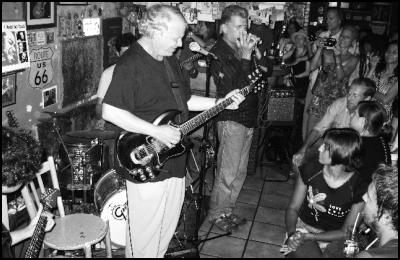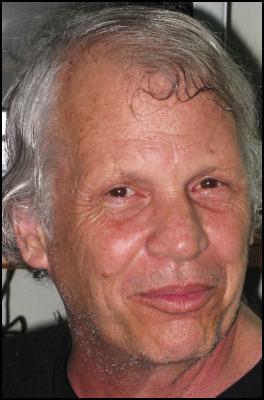Country Joe's "Fish" Opposes US War In Afghanistan
Country Joe's "Fish" Opposes U.S. War In Afghanistan
by Richard S. Ehrlich
Click to enlarge
Barry "The Fish" Melton jams in a Bangkok bar, while visiting Thailand to see if this region is "a viable option for playing music" alongside local musicians.
(Photo copyright by Richard S. Ehrlich)
BANGKOK, Thailand -- When Country Joe and The Fish performed their famous satirical protest song "Fixin' To Die" during the 1960s, they influenced many people to oppose America's disastrous Vietnam War.
Today, Barry "The Fish" Melton -- still a self-proclaimed "leftist" -- grimly predicts the U.S. is doomed to also lose its war in Afghanistan.

Click to enlarge
"I don't think we should be involved in Afghanistan, I think it is a waste of time and energy."
(Photo copyright by Richard S. Ehrlich )
"I don't think we should be involved in Afghanistan, I think it is a waste of time and energy," Melton said in an interview on April 3, when he arrived in Bangkok on his first visit to Southeast Asia.
"I've got to believe that whatever we are doing in Afghanistan will end up in failure, that it can't have an outcome that is particularly positive for anybody."
When Melton and "Country" Joe MacDonald created the San Francisco-based band, one of their most catchy and powerful songs had a vaudeville-style chorus which mockingly taunted:
"And it's one, two, three / What are we fighting for? / Don't ask me I don't give a damn / Next stop is Vietnam."
Gray-haired Melton now performs with other bands in California and Europe.
He is scheduled to perform at several venues in Bangkok, Chiang Mai and Krabi during April [see "Sidebar Box" at the end of this story's text].
But he worries that if he writes protest songs against the war in Afghanistan, it might prove counterproductive.
"When we were doing our music in the '60s, we were doing our music for people our age, who were often-times conscripted into the service, to fight in a war that they didn't believe in, or understand.
"It's much more difficult, in modern times, with an all-volunteer army, and in a situation where I'm no longer of the generation that's fighting.
"In a way, it's almost as remote as going to fight a war on behalf of people who live 10,000 miles away. It's not my generation's fight. It's another generation's fight," he said.
"I'm not saying that I can't write a protest song. I'm sure I can. I've written some before. I can write some more.
"But I can't tell my kids what to do. In fact, if I wrote an anti-war song, one of them might go join the military just to piss me off.
"I've got two boys, one who is going to be 24 in July, and one who just turned 33," he said.
"I'm happy they're not soldiers."
Melton said his wife has "a nephew in the military. He's a sweet kid. It's complicated stuff. He thinks he's doing the right thing, I'm sure.
"The country's always going to need a military, on some level. And then the question becomes, 'So what are they doing?' -- not, 'Why do people join the military?'
"Sadly, we need cops too. Given what I've done for the last 27 years, I'm not really a cop kind of guy, but I have friends who are cops."
Melton recently retired from a 27-year career as a California criminal defense lawyer, including a decade as a public defender.
Over the years, Melton's strongest protests have been expressed through his work as a defense lawyer.
"In my world, the issues that are paramount in importance are such small issues as the over-incarceration of people of color, or the over-incarceration of people, period.
"The repression of drug laws. The ridiculousness of laws that govern people's sexual conduct, other than the exploitation of children. A whole panoply of repressive laws, and questionable constitutional practices, from an American point of view.
"Those issues are more intimate to me."
Many fans heard his opulent and eloquent guitar-playing with Country Joe and The Fish on vinyl record albums, and at anti-war rallies, Woodstock, the Monterey Pop Festival, and outdoor psychedelic love-ins.
"We took acid a lot," a grinning Melton said while describing some of the band's early creative style.
"Certainly we recorded while we were high on acid. And we certainly listened to music on acid, and used whatever state of awareness we were in, while high, to make certain judgment calls," he said, describing the evolution of their unique sound.
"We were ordering peyote caps from a store in Texas or New Mexico, because back in 1965 they were selling it legally. I want you to know I didn't break the law. You could actually order it from some, like nursery, or something like that in Texas or New Mexico.
"We sent for it in the mail, and they mailed us the peyote buttons, and then we took the peyote buttons. And I used that to go mix the first electric EP (extended play recording) of the band. By the way, LSD wasn't illegal either, but that's another story."
Melton, who will be 63 years old in June, says he voted for President Barack Obama, but now suffers from political bait-and-switch.
"Like most of my friends on the left, we have been disappointed that the guy hasn't done more," Melton said.
"He seems all too willing to compromise on all too many issues, including Afghanistan, and the war in Iraq, and the closing of Guantanamo Bay, and all kinds of issues where he had a chance to really take a firm stance -- and has not.
"Look, I thought that I was voting for the second coming of Franklin D. Roosevelt, OK? Call me crazy.
"I contributed a lot of money to his campaign, and I thought he would take sweeping, broad moves like Roosevelt did. Roosevelt put it all on the line.
"People don't realize how courageous Franklin Roosevelt was until they look at somebody like Barack Obama and realize how 'uncourageous' he is.
"He is not Franklin D. Roosevelt. Not even close. He doesn't have the stature, and he doesn't have the character to call himself a Roosevelt transformational figure."
Despite his shattered illusions, Melton remains loyal.
"I'll probably vote for him again. Especially if they put up somebody like Sarah Palin."
Ironically, Obama's election slogans were dreamy lyrics to Melton, who ended up dancing to a seemingly imaginary tune.
"When he said 'hope' and 'change' and all those magical words, and it was coming out of an African-American guy -- and me being an old civil rights worker -- I thought, 'Wow, it's happening man'."
Melton arrived here for a one-month tour of Thailand and the region with his wife, Barbara, to visit a friend who lives in Bangkok, and see if this region is "a viable option for playing music" alongside local musicians.
"I've been touring in Europe now for the last decade or so. In a lot of ways, I'm probably more appreciated for my music in Europe than I am at home. I want to see if there is a market here for what I do."
No longer jamming with Country Joe, Melton plays in and around San Francisco in his own group -- The Barry "The Fish" Melton Band -- with other aging rockers.
"I have Peter Albin on bass, who was the bass player with Big Brother and the Holding Company; Banana on keyboards, who was a multi-instrumentalist with the Youngbloods; and Roy Blumenfeld on drums, who was the drummer for The Blues Project and for Sea Train.
"Now we're playing rock music, probably linked to our period, but it's become in many respects an improvisational art form, akin to jazz.
"It's a certain kind of improvisational rock."
Richard S Ehrlich is a Bangkok-based journalist who has reported news from Asia since 1978. He is co-author of "Hello My Big Big Honey!", a non-fiction book of investigative journalism. His web page is
http://www.asia-correspondent.110mb.com
(Copyright 2010 Richard S Ehrlich)


 Martin LeFevre - Meditations: For The Love Of Sycamores
Martin LeFevre - Meditations: For The Love Of Sycamores Ian Powell: A Timely Call For A Social Contract In Health
Ian Powell: A Timely Call For A Social Contract In Health Binoy Kampmark: Bratty Royal - Prince Harry And Bespoke Security Protection
Binoy Kampmark: Bratty Royal - Prince Harry And Bespoke Security Protection Keith Rankin: Make Deficits Great Again - Maintaining A Pragmatic Balance
Keith Rankin: Make Deficits Great Again - Maintaining A Pragmatic Balance Richard S. Ehrlich: China's Great Wall & Egypt's Pyramids
Richard S. Ehrlich: China's Great Wall & Egypt's Pyramids Gordon Campbell: On Surviving Trump’s Trip To La La Land
Gordon Campbell: On Surviving Trump’s Trip To La La Land